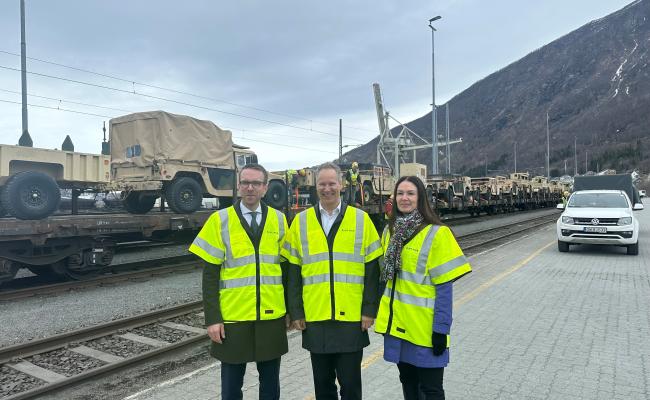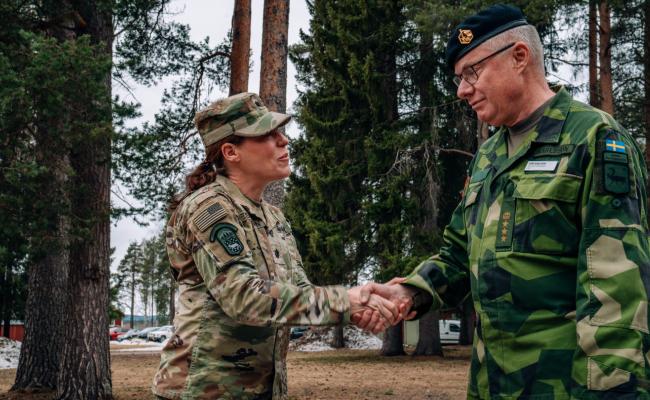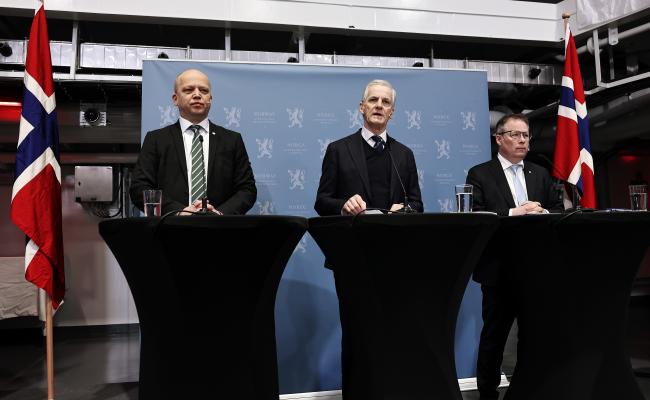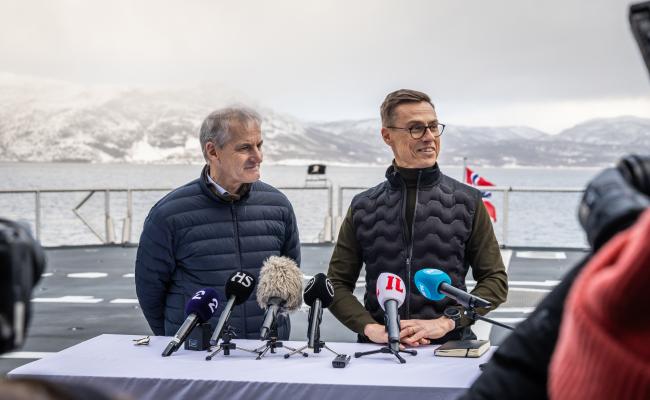NATO’s New Northern Flank: Norway’s Army Chief Expects Great Responsibility
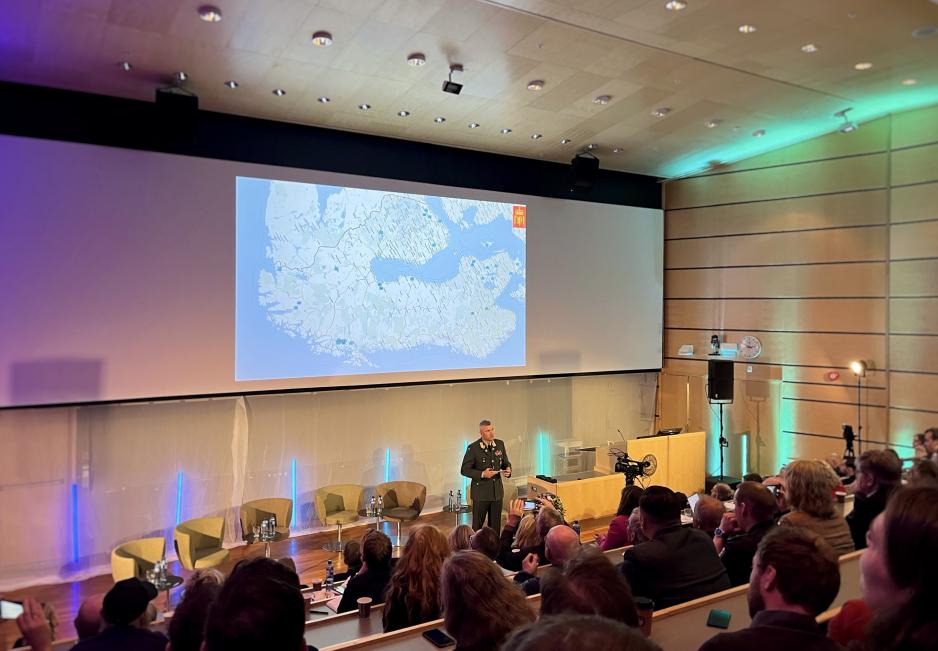
The Chief of the Norwegian Army, Major General Lars Lervik, addressed the current security situation and the development of Nordic cooperation in the North at the recent Response conference in Tromsø, Northern Norway. It was organized by the Norwegian Ministry of Foreign Affairs and UiT – the Arctic University of Norway, and encouraged new thinking on the country’s foreign and security policy in the High North and Arctic. (Photo: Astri Edvardsen)
Tromsø (High North News): The bulk of Sweden and Finland's army forces are located in the south, while most of Norway’s land forces are in the north. "These conditions will likely be important in further developing our cooperation," says the Chief of the Norwegian Army, pointing to new requirements and opportunities.
A map of the Nordic region without state borders. With an overview of central roads and the location of Norway, Sweden, and Finland's most important army units.
This serves as a springboard for the perspective of opportunities that the Chief of the Norwegian Army, Major General Lars Lervik, outlines at the recent Response conference in Tromsø, Northern Norway.
The map does not only imply prospects of border-crossing cooperation along the west/south and north/south axes to strengthen the defense of Norway and the Nordic region.
It also implies an integration that will demand more from the Norwegian military forces in the North, in addition to Norway's new role as a reception and transit country in light of NATO's Nordic enlargement.
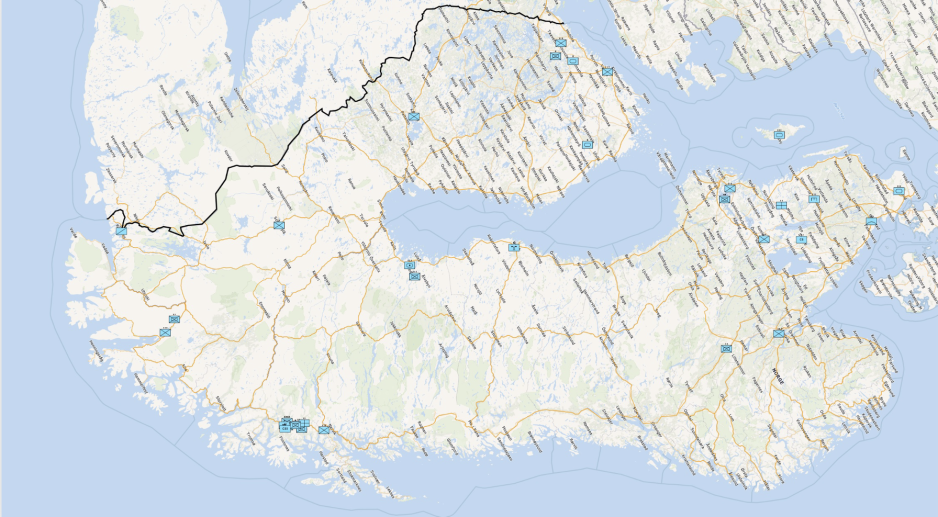
"When I am looking for opportunities, I look at a map. It is part of the profession," says Army Chief Lervik, showing this graphic rendering of Norway, Sweden, and Finland as a borderless landscape with significant road connections and land forces. (Map: the Norwegian Army)
"We see that the Swedish and Finnish army units are mainly concentrated in southern parts of the countries, which seems to reflect their security policy interests, while Norway has gathered the bulk of the land forces in the North. These are conditions that will likely be important in the further development of our cooperation. Because I do not think these interests will be zeroed out, but rather that we must cooperate with this as our starting point," says Lervik.
"And what does that mean? Well, it means that when we develop a joint plan for the defense of the Nordic region, perhaps particularly in the North, Norway must still be prepared to take great responsibility, as I see it. We must think not just about our own territory but also about how we will be able to operate with land and air forces in Northern Sweden and Northern Finland. It will set new demands but also provide us with new opportunities."
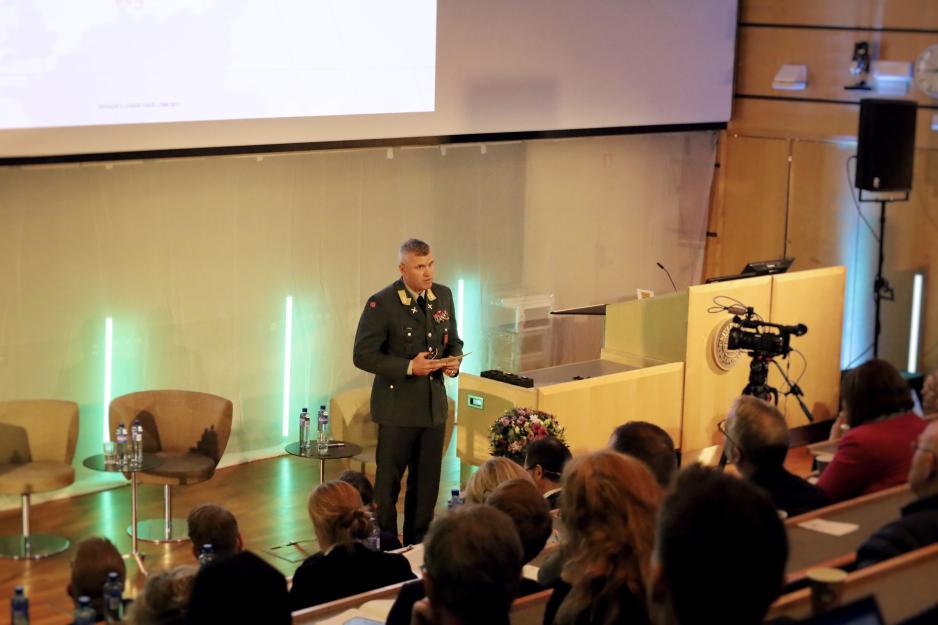
"The Norwegian government's proposal for a long-term defense plan points to how we both can and will have to expect more of the alliance in the time coming, but also that the alliance will have to expect more from us. This is the background for the significant strengthening of the Norwegian Armed Forces suggested for the coming years," notes Lervik to the audience at the Response conference at UiT – the Arctic University of Norway. (Photo: Astri Edvardsen)
Russian presence
Russia's announced increased military presence in NATO's northern border areas is also significant in the new defense assessment in which Lervik sees great responsibility for Norway.
"In his professional advice, Norway's Chief of Defense points to how the Swedish and Finnish NATO membership clearly strengthens deterrence and collective defense in our part of the world. At the same, it is pointed out that Russia has announced a strengthening of its military footprint in the High North," he says and continues:
"Russia already has significant military capacities, particularly strategic resources, in the North. The country announces military reinforcement around the Kola Peninsula and along the Russian-Finnish border, which will be reminiscent of the conditions during the Cold War. The strengthening has not yet materialized because Russian resources are prioritized for the ongoing war in Ukraine, but we are following this closely."
By extension, the army chief refers to Norwegian MFA Espen Barth Eide's (Labor) speech at the conference:
"Norway as a reception area for allied reinforcement and logistics – and not just for Norway's benefit, but also for the Nordic region – has seen increased significance in the emerging security situation. The MFA states that the High North is Norway's most important strategic area, and continuous presence and situational awareness is therefore central," says the major general.
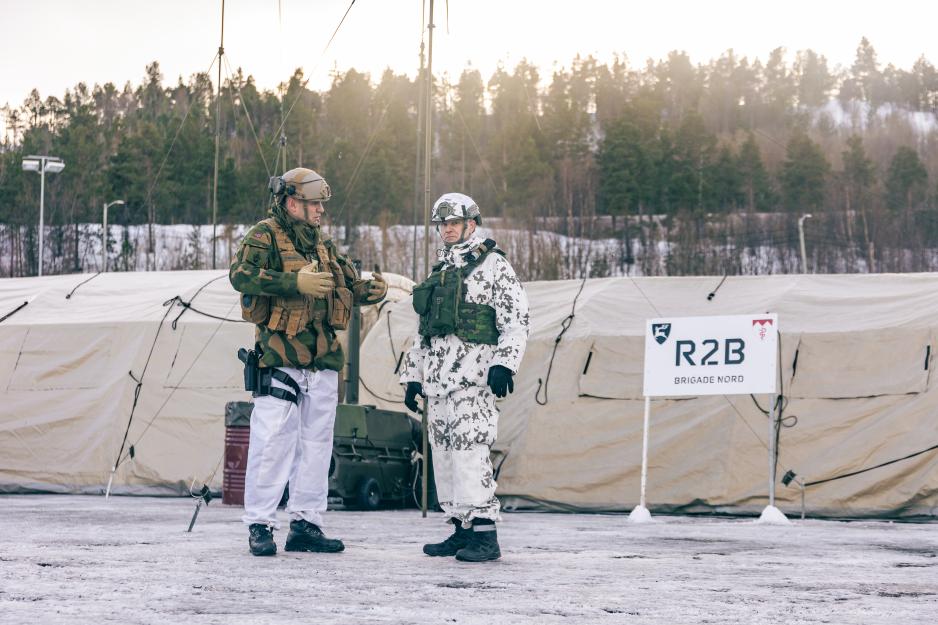
Norway's Army Chief, Major General Lervik (to the left), converses with Finland's Army Chief, Lt. General Pasi Välimäki, during this winter's major exercise, Nordic Response. It took place in March, across northern parts of Norway, Finland, and Sweden – and included a historic crossing of the Norwegian-Finnish border, in which Finnish and Swedish forces arrived as allied reinforcements for the first time. (Photo: Tor-Magnus Øverås/the Norwegian Armed Forces)
Shared possibilities
From challenging prospects to exploring opportunities with Sweden and Finland as new allies – with which the three countries' army chiefs are well underway:
"When I discuss with my colleagues on the Swedish and Finnish side, some obvious opportunities exist. And we have increased our dialogue in the past years – we speak together weekly and meet monthly," says Lervik and continues:
"One thing is to have a joint plan. Another is to cooperate where we can regarding equipment and logistics. For example, we are now considering the possibility of buying the same type of equipment. We have previously decided to acquire the same type of uniform, but we will now look at joint purchases of more advanced systems. This provides both economies of scale and room for collaboration on logistics, maintenance, and so forth."
"I also want to highlight an area that is not addressed much: precisely that we represent cutting-edge expertise on Arctic operations. When allies are to learn something about operating in an Arctic environment, they come to us. Forces come from Alaska to learn from us. This obviously carries strong military aspects, but there is also great potential for total defense here."
With this, the army chief seems to imply possibilities for Nordic cooperation on total defense with an Arctic framework from which other NATO countries could benefit. The US may be among possible interested parties in such cooperation as the DoD highlights the significance of Norway, Finland, and Sweden's Arctic expertise.
Also read (the article continues)
Preparedness
Collaboration in the Northern Nordic region precisely around total defense is also one of the key opportunities that Lervik sees.
Total defense is about cooperation and mutual support between the military defense and civilian society – in areas such as prevention of adverse events, preparedness planning, and operative conditions.
"In its proposal for a long-term defense plan, the Norwegian government points to several areas in which total defense is important. Cooperation regarding roads, railways, and airports is particularly emphasized. It also points to the facilitation of borderless passages for military units in the Nordic region. As this is well-covered in the long-term plan, I will instead highlight some other areas where I see potential for cooperation," says the army chief.
"One is within the police force: prevention, law, and order. As I see it, it will be essential that we – perhaps particularly in the North – have a seamless and good dialogue across country borders in this area. For example, suppose we discover that it is not just an ordinary Monday in Alta, Northern Norway. In that case, we should be able to talk quickly with neighbors in Boden, Northern Sweden, and Rovaniemi, Northern Finland, and find out if what is happening on our side is part of something bigger. I think this will be important in the coming years to protect our joint democracy and ensure our security."
Also read
Development of knowledge and technology
Major General Lervik would also like to see more Nordic cooperation in research and development with relevance to defense and security.
"Academia is the other area I would like to point to. Climate research is important in many contexts, including the military. Among others, the University in Tromsø [UiT, ed. note] has a good position within such research that we should exploit further in a Nordic context. Comparative research on security policy is also interesting: What does the world look like from Tromsø versus Rovaniemi or Boden, for example? I think it is important to compare the various perspectives," he states.
"Finally, I want to point out the potential for technology cooperation. Technology development is and will be important to us in the North. Here we must have military and multi-purpose technology that meets entirely different requirements than on the European continent. Tromsø, for example, has a strong professional environment within unmanned systems. This is important to the Norwegian defense but also attracts major interest from our allies, in my experience."
Investment in defense-oriented technology and knowledge development in Northern Norway is underway as part of the government's aforementioned long-term defense plan proposal. Specifically, it is an establishment under the auspices of the Norwegian Defense Research Establishment (FFI), which wants Tromsø to be a hub.
By extension of Lervik's consideration and experienced interest, this venture could perhaps branch across the Cap of the North's national borders.
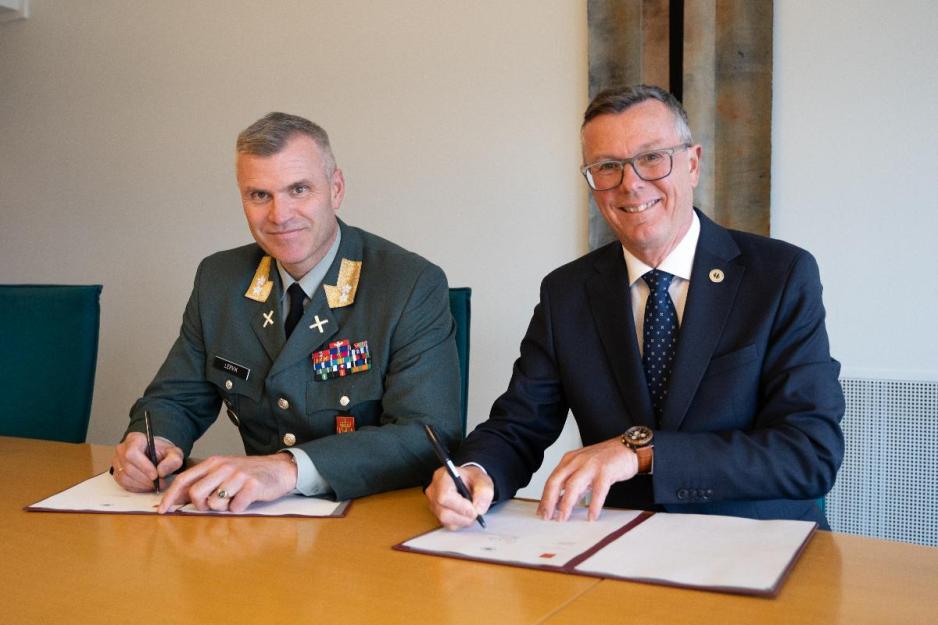
The Chief of the Norwegian Army, Major General Lars Lervik, and Rector of UiT – the Arctic University of Norway, Dag Rune Olsen, sign an updated and expanded letter of intent for cooperation between the parties. (Photo: Trude H. Moe/UiT – the Arctic University of Norway)
Strengthened interaction with UiT
At the conference's sideline, the Norwegian Army and UiT also entered a more expansive collaboration: Army Chief Lervik and Rector Dag Rune Olsen signed a three-year continuation of an existing letter of intent between the institutions.
The agreement covers research and development work (R&D) and education, as well as the establishment of a working group that will manage and develop collaborative projects.
With this agreement, the Army and UiT can initiate shared R&D projects within drone or satellite technology, simulation, autonomous vehicles, artificial intelligence, and 3D printing, among other things.
UiT points out that FFI's expected establishment in Tromsø can also open the door to even closer cooperation on technology development.
In terms of education, UiT already offers army employees part-time studies within the following programmes: a shorter study in sports science, a bachelor's degree in political science, and bachelor's degree in economy and administration. Various session-based and flexible master programs are also popular among army personnel.
"The Army needs civilian education to fill up our total expertise needs. Expertise exchange with UiT is important to meet the Army's future needs and, thus, facilitate the development of the future Army on a solid knowledge base," Lervik maintains.




